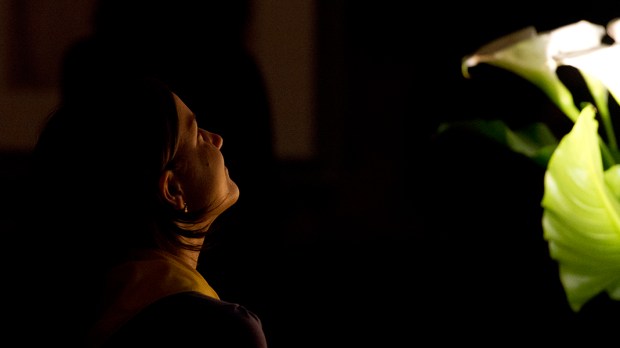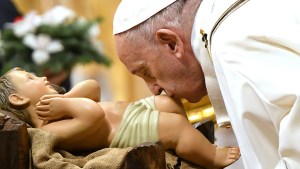During the worst days of the Covid lockdown, I was asked to give a Zoom presentation on “Joy in a Time of Pandemic.” I was psyched about the topic because I am a big believer in joy, which proves its mettle most in times of tribulation.
I think I learned this from St. John the Baptist, one of my favorite saints. Because it was while John the Baptist endured his own grueling lockdown—confined in prison by King Herod—that he experienced one of the greatest joys of his life.
The Gospel (Mt 11:2-11) tells us that, from his dungeon cell, John “heard of the works of the Christ.” So he sent his disciples to Jesus with the burning question: Are you the one who is to come, or should we look for another? Our Lord could have replied very simply: I am the one. But he didn’t. Instead, Jesus opted for an elaborate answer smacking of a riddle: Go and tell John what you hear and see: the blind regain their sight, the lame walk, lepers are cleansed, the deaf hear, the dead are raised, and the poor have the good news proclaimed to them. Why this brainteaser response?
In fact, there is no “the” before these nouns in the Greek version of the text. Which means that Jesus is asserting that it is not merely certain afflicted individuals, but rather blindness, lameness, leprosy, deafness, and death itself that is being conquered in him. The Greek, however, does employ the word “and” five times. “The fivefold repetition of the conjunction ‘and’ gives us the feeling of an unending story” (E. Leiva-Merikakis), implying countless unmentioned sorrows—like the ones in your life—that Jesus promises to conquer as well!
Jesus wants John to be overcome with joy in his imprisonment. St. Thomas Aquinas speaks of joy as “a well-being of the spirit in response to what exists”—in other words, joy wells up in us when we recognize the good things God brings forth. Thus the motive for the Lord’s roundabout response: Jesus acts to put John face-to-face with brand new wonders existing in the world thanks to Jesus’ incarnate Presence. And then the Lord leaves it to the Baptist to do the math.
This is in keeping with the very way that John the Baptist in the desert himself heralded the coming of Jesus. He blesses the people with a new way of looking at the world … of regarding reality. “John the Baptist interrupted what people saw as a life of disconcerting drought” (L. Giussani). The papal preacher, Cardinal Raniero Cantalamessa, explains:
John helps the people to look past the wall of contrary appearances to make them see the Messiah hidden behind the semblance of a man like others. The Baptist in this way inaugurated the new Christian form of prophecy, which does not consist in proclaiming a future salvation, but in revealing the hidden presence of Christ in the world.
But so often we remain oblivious to that Presence, giving short shrift to joy. Joy by definition is the gladness, the satisfaction that appears when our will possesses something which leads to our genuine happiness. Joy is the response of the human heart to what it perceives as an authentic promise of life. And Christ’s Presence is just that!
And here is the wondrous thing about joy: Joy can coincide with sadness—because of the promise joy contains. But,joy cannot coexist with fear! Why do we end up becoming manipulated by fear, surrendering our life’s joy? Because we are no longer anchored by The Promise. We no longer have our gaze fixed on The Promise. As long as we are afraid, we are not looking for love. Instead, when menaced by something, we’re on the lookout for power. Keeping our eyes focused on The Promise is what Advent is all about.
The heroic opponent to Nazism, Jesuit Fr. Alfred Delp—locked in solitary confinement by his Nazi captors, tortured, his hands constantly in handcuffs—on smuggled slips of paper wrote from his cell:
The promises of God stand above us, more valid than the stars and more effective than the sun. Based on these promises, we will become healthy and free, from the center of our being. The promises have turned us around and opened life out into the infinite. Even lamentation retains the song of these promises, and distress their sound, and loneliness their confidence.
At the core of the promises stands this fact: “The desire for joy is inherently stronger than the fear of sadness” (St. Thomas Aquinas). That is why Fr. Delp insists that each person “should take joy as seriously as he takes himself. And he should believe in his heart and in his Lord God, even through darkness and distress, that he is created for joy. Such a life knows it is on the right path to perfection.” The philosopher/mystic Simone Weil observed: “Suffering is violence, joy is gentleness, but joy is the stronger.”
Keep this in mind: Joy is the only real enemy to Satan! Who understood this better than J.R.R. Tolkien who went so far as to invent an expression that attempts to capture the invincibility of joy:
I coined the word “eucatastrophe”: the sudden happy turn in a story which pierces you with a joy that brings tears. It produces its peculiar effect because it is a sudden glimpse of Truth; your whole nature chained in material cause and effect, the chain of death, feels a sudden relief as if a major limb out of joint had suddenly snapped back. Just as the hero of a mythical tale is on the verge of a disastrous dead end, with his demise looming before him, terrible and inevitable, the eucatastrophe happens: The good catastrophe, the sudden joyous “turn”—this joy is a sudden and miraculous grace. It denies universal final defeat, giving a fleeting glimpse of joy. Joy beyond the walls of the world, poignant as grief.
“The source of Christian joy,” wrote Pope Benedict XVI, “is the certainty of being loved by God, loved personally by our Creator, by the One who loves each one of us with a passionate and faithful love, a love greater than our infidelities and sins, a love which forgives.” How can this Love that is coming to claim us not cause a eucatastrophe in us?
“If there is an answer to death, it will make genuine joy possible” (J. Ratzinger). And there is a definitive answer to death. That’s what moves us to rejoice this Gaudete Sunday and to convince us to take our joy seriously.


